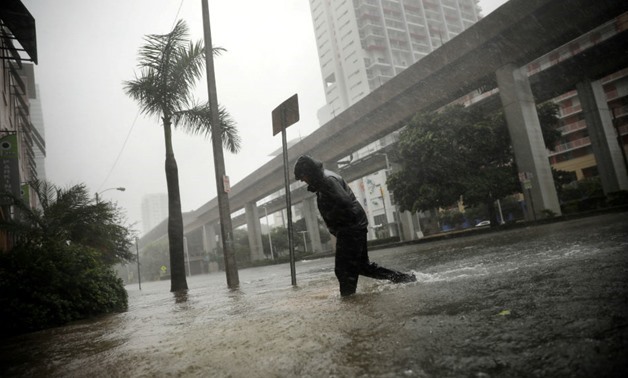
A local resident walks across a flooded street in downtown Miami as Hurricane Irma arrives at south Florida, US September 10, 2017. Carlos Barria, Reuters
12 September 2017:Millions of Florida residents were without power and extensive damage was reported in the Florida Keys but most of the Sunshine State appeared to have dodged forecasts of catastrophic damage from Hurricane Irma.
The monster storm roared ashore as a powerful Category 4 hurricane when it hit the Keys southern island chain on Sunday, ripping boats from their moorings, flattening palm trees and downing power lines, after devastating a string of Caribbean islands.
By the time it hit the peninsula the storm had been downgraded and weakened further to a tropical depression late Monday.
But while Florida may have escaped the worst, the death toll jumped to at least 40 after Cuba said 10 people had been killed there over the weekend as Irma spun northward.
Across the Caribbean, hard-hit residents struggled to get back on their feet as Britain, France, the Netherlands and the United States ramped up relief efforts for their overseas territories.
Florida residents who spent an anxious night huddled indoors were venturing out Monday to survey the damage, which did not seem to be as bad as initially feared.
"If this had been a Category 4 hurricane the whole scenario would have been completely different," said Bob Lutz, a 62-year-old business owner.
More than 6.5 million customers in Florida were without power, however, and Governor Rick Scott said the Keys had suffered a lot of damage.
"It's horrible what we saw," Scott said after flying over the island chain with the Coast Guard.
He said the water, electricity and sewage systems in the Keys were all non-operational and that trailer parks had been "overturned."
"We now go through the much longer phase, which is the recovery phase. And believe me, folks, some of this is going to take a while, especially power restoration," Miami Mayor Carlos Gimenez cautioned.
Most Keys residents had followed mandatory evacuation orders, but there were some holdouts who had to hunker down as Irma slammed into the low-lying tourist archipelago known for its fishing, scuba diving and boating.
The storm downed power lines, felled trees and left debris and vehicles strewn across the streets. But concrete homes appeared to have withstood the gusts.
Irma now a tropical depression
Though Irma was downgraded to a tropical depression, forecasters warned of "life-threatening" surf and rip currents.
Florida's northeastern city of Jacksonville, population 880,000, ordered urgent evacuations amid record flooding along the St Johns River.
Flooding was also reported in the city of Charleston, South Carolina.
Irma's maximum sustained winds had decreased to 35 miles (56 kilometers) per hour as of 11:00 pm (0300 GMT Tuesday). Irma's eye was in western Georgia, and expected to cross into eastern Alabama and western Tennessee later Monday.
Irma had triggered orders for more than six million people in the United States to flee to safety, one of the biggest evacuations in the country's history.
In flood-prone Miami, the largest US city in Irma's path, cleaning crews were busy clearing branches, debris and fallen street signs from downtown.
10 dead in Cuba
In Bonita Springs, a city of 50,000 people on Florida's hard-hit southwest coast, large areas were flooded and the entire city was without power. Some residents were trying to reach their homes by walking through floodwater up to their waists, while others paddled canoes.
"I don't think I can make it over to the house. I'd like to walk through there, but it looks like it's three feet (one meter) deep at least, and my boots are only a foot deep and I don't like cold water, which explains why I live here," Sam Parish told AFP.
As residents began to check out their homes, authorities warned of downed power lines, raw sewage in floodwaters and -- this being Florida -- displaced wildlife like snakes and alligators.
"Don't think just because this has passed you can run home," Governor Scott said. "We have downed power lines all across the state.
"We have roads that are impassable," he said. "We have debris all over the state."
President Donald Trump has approved the state's request for emergency federal aid to help with temporary housing, home repairs, emergency work and hazard mitigation. He has promised to travel to the state "very soon."
Before reaching the United States, Irma smashed through a string of Caribbean islands from tiny Barbuda on Wednesday, to the tropical paradises of Saint Barthelemy and Saint Martin, the US Virgin Islands, Puerto Rico, the Dominican Republic, Haiti and the Turks and Caicos Islands.
Panama said it was distributing at least 90 tonnes of humanitarian aid to Saint Martin and Cuba, while Venezuela -- itself beset by shortages amid a crippling economic crisis -- has sent 30 tonnes of food, potable water and supplies to Cuba and other Caribbean islands.
About 400 exhausted and traumatized survivors of Hurricane Irma arrived in France and the Netherlands on Monday aboard military planes.
An aircraft with 278 aboard landed in Paris, while another 100 people flew into Eindhoven in the southern Netherlands from the Guadeloupe capital Pointe-a-Pitre.
Both the French and Dutch governments have come under criticism over delays in their responses to the crisis and in particular over how they handled outbreaks of looting on Saint Barthelemy and Saint Martin, an island with both French and Dutch sectors.
In Cuba, officials said Irma was the deadliest hurricane to strike the island since Dennis in 2005, and warned the toll could rise.
Three quarters of the population were without power as the authorities began the task of restoring basic infrastructure and services.
"This is a big warning already, when you know that climate change is getting more and more cruel," said Francisco Garcia, coach of Cuba's national karate team, whose home here was partially destroyed.


Comments
Leave a Comment